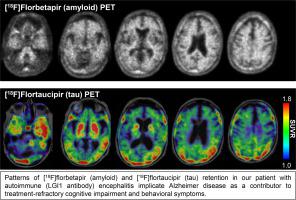当前位置:
X-MOL 学术
›
J. Neuroimmunol.
›
论文详情
Our official English website, www.x-mol.net, welcomes your
feedback! (Note: you will need to create a separate account there.)
Leveraging molecular biomarkers to make the common diagnosis in the uncommon patient
Journal of Neuroimmunology ( IF 2.9 ) Pub Date : 2021-03-01 , DOI: 10.1016/j.jneuroim.2021.577474 Gregory S Day 1 , Brian A Gordon 2 , Robert C Bucelli 3 , Richard J Perrin 4 , A Sebastian Lopez-Chiriboga 1 , Beau M Ances 5
Journal of Neuroimmunology ( IF 2.9 ) Pub Date : 2021-03-01 , DOI: 10.1016/j.jneuroim.2021.577474 Gregory S Day 1 , Brian A Gordon 2 , Robert C Bucelli 3 , Richard J Perrin 4 , A Sebastian Lopez-Chiriboga 1 , Beau M Ances 5
Affiliation

|
BACKGROUND AND PURPOSE
The factors that predispose to relapse in patients recovering with autoimmune encephalitis (AE) are largely unknown, complicating efforts to distinguish patients with resurgent symptoms who may benefit from additional immune-modulating therapies from those with other causes of impairment. METHODS
We report a patient with AE with leucine-rich glioma-inactivated 1 autoantibodies with a typical presentation, but atypical course complicated by treatment-refractory psychoses and progressive cognitive decline. We leveraged emergent molecular biomarkers, including [18F]florbetapir (amyloid) and [18F]flortaucipir AV45 (tau) PET neuroimaging, to evaluate for common neurodegenerative causes of impairment. The patient was followed until death and a brain autopsy performed. RESULTS
No evidence of active inflammation was observed on neuroimaging or cerebrospinal fluid analyses in our patient with resurgent, treatment-refractory cognitive decline. [18F]Florbetapir and [18F]flortaucipir retention were increased in cerebral cortices in a pattern consistent with symptomatic Alzheimer's disease. Immunomodulatory therapies were stopped, and appropriate counseling provided to the patient and family. The patient died 2.4 months following [18F]flortaucipir PET neuroimaging. Brain autopsy confirmed changes typical of Alzheimer's disease without evidence of active inflammation or sequelae of AE, establishing Alzheimer's disease as the likely cause of resurgent symptoms in this patient. CONCLUSIONS
Symptoms of age-related neurodegenerative illnesses may emerge following AE, particularly in older patients in whom neurodegenerative dementing illnesses are more common. Molecular biomarkers may aid in the evaluation of treatment-refractory patients with resurgent symptoms and signs, influencing management.
中文翻译:

利用分子生物标志物对罕见患者进行常见诊断
背景和目的 自身免疫性脑炎 (AE) 康复患者易复发的因素在很大程度上是未知的,这使得区分可能受益于额外免疫调节治疗的复发症状患者与其他原因损伤的患者的努力变得复杂。方法 我们报告了一名 AE 患者,其具有富含亮氨酸的胶质瘤灭活 1 自身抗体,具有典型表现,但非典型病程并发治疗难治性精神病和进行性认知能力下降。我们利用新兴的分子生物标志物,包括 [18F]florbetapir(淀粉样蛋白)和 [18F]flortaucipir AV45 (tau) PET 神经影像学,来评估常见的神经退行性损伤原因。对患者进行随访直至死亡并进行脑部尸检。结果 在我们患有复发性、治疗难治性认知衰退的患者中,在神经影像学或脑脊液分析中未观察到活动性炎症的证据。[18F] Florbetapir 和 [18F]flortaucipir 在大脑皮质中的保留增加,其模式与有症状的阿尔茨海默病一致。停止免疫调节治疗,并向患者和家属提供适当的咨询。患者在 [18F]flortaucipir PET 神经影像学检查后 2.4 个月死亡。脑部尸检证实了阿尔茨海默病的典型变化,没有活动性炎症或 AE 后遗症的证据,确定阿尔茨海默病是该患者症状复发的可能原因。结论 AE 后可能出现与年龄相关的神经退行性疾病的症状,特别是在神经退行性痴呆疾病更为常见的老年患者中。分子生物标志物可能有助于评估具有复发症状和体征的难治性患者,从而影响管理。
更新日期:2021-03-01
中文翻译:

利用分子生物标志物对罕见患者进行常见诊断
背景和目的 自身免疫性脑炎 (AE) 康复患者易复发的因素在很大程度上是未知的,这使得区分可能受益于额外免疫调节治疗的复发症状患者与其他原因损伤的患者的努力变得复杂。方法 我们报告了一名 AE 患者,其具有富含亮氨酸的胶质瘤灭活 1 自身抗体,具有典型表现,但非典型病程并发治疗难治性精神病和进行性认知能力下降。我们利用新兴的分子生物标志物,包括 [18F]florbetapir(淀粉样蛋白)和 [18F]flortaucipir AV45 (tau) PET 神经影像学,来评估常见的神经退行性损伤原因。对患者进行随访直至死亡并进行脑部尸检。结果 在我们患有复发性、治疗难治性认知衰退的患者中,在神经影像学或脑脊液分析中未观察到活动性炎症的证据。[18F] Florbetapir 和 [18F]flortaucipir 在大脑皮质中的保留增加,其模式与有症状的阿尔茨海默病一致。停止免疫调节治疗,并向患者和家属提供适当的咨询。患者在 [18F]flortaucipir PET 神经影像学检查后 2.4 个月死亡。脑部尸检证实了阿尔茨海默病的典型变化,没有活动性炎症或 AE 后遗症的证据,确定阿尔茨海默病是该患者症状复发的可能原因。结论 AE 后可能出现与年龄相关的神经退行性疾病的症状,特别是在神经退行性痴呆疾病更为常见的老年患者中。分子生物标志物可能有助于评估具有复发症状和体征的难治性患者,从而影响管理。











































 京公网安备 11010802027423号
京公网安备 11010802027423号